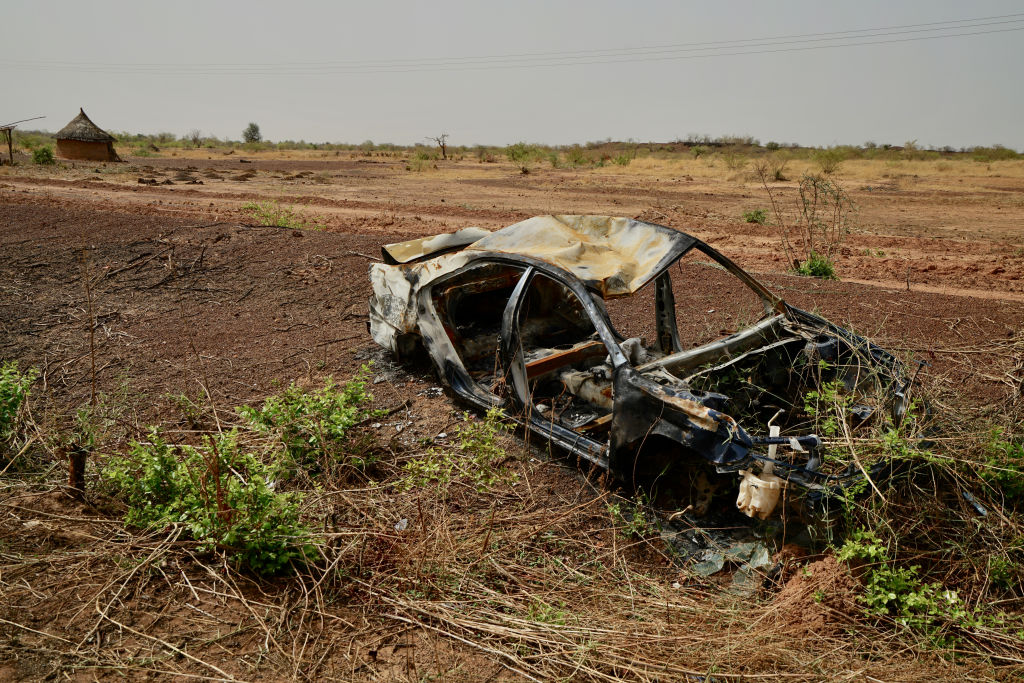ADF STAFF
Newly released video shows Jama’at Nusrat al-Islam wal-Muslimin (JNIM) fighters in Burkina Faso marching with weapons held aloft and lining up on motorcycles. Analysts say the display of force is evidence that the terror group feels secure and is pushing to expand its reach despite the efforts of the country’s military junta.
“The photos offer the first public glimpse at JNIM’s training structure inside Burkina Faso, where it, as well as militants from its rival organization Islamic State Sahel Province, control at least 40% of Burkinabe territory,” Bridgeway Foundation analyst Caleb Weiss wrote in Long War Journal.
In the photos produced by JNIM’s media arm, about a dozen men wearing camouflage and head coverings train with small arms and ride motorcycles on a barren stretch of ground backed by low trees. The images amount to a public warning that JNIM and other extremist groups are able to set up and run training camps anywhere and any time they want, Weiss wrote.
Until recently, JNIM had operated its training camps across the border in Mali.
The current ruling junta, led by Capt. Ibrahim Traoré, took power in 2022 with the promise of eliminating JNIM and other terrorist groups. Traoré’s junta in September 2022 and the earlier junta that overthrew democratically elected President Roch Marc Christian Kaboré in January 2022 both justified their actions by saying Kaboré’s government was incapable of reining in the terrorists.
Since then, JNIM and Islamic State Sahel Province have expanded their territory and increased the death toll from their fight against government forces, volunteer militias and Russian mercenaries with Africa Corps, the organization formerly known as the Wagner Group.
As a result, Burkina Faso tops the Global Terrorism Index’s ranking of the countries most affected by terrorism. In 2023, 2,000 people in Burkina Faso died in 258 terrorism-related incidents, amounting to nearly a quarter of all terrorist deaths worldwide.
May 2024 was Burkina Faso’s deadliest month in more than a year, according to the Armed Conflict Location and Event Data (ACLED) project. Fighting across the country killed more than 900 civilians in May, according to the group.
“Civilians were targeted on numerous occasions by both sides, often under the accusation of being suspected collaborators of opposing forces,” ACLED reported.
The Burkinabe military was responsible for 270 deaths in communities in Yagha and Komondjari provinces, making it among the deadliest forces in the country. Both provinces are in Burkina Faso’s far east on the border with Niger.
Meanwhile, JNIM fighters continue to attack communities that supply members to or show support for the Volunteers for the Defense of the Homeland (VDP), the lightly armed and poorly trained militias that Traoré’s government set up to supplement the military.
JNIM’s expansion from Mali and the newly-revealed Burkinabe training camps raise the prospect of the group establishing a quasi-state within the territory it controls, according to analyst Tammy Palacios of the Priority Sustainable Counterterrorism Initiative. In many areas, JNIM now controls most aspects of daily life, she added.
“Without intervention, JNIM will further establish itself as a non-traditional governing entity in Burkina Faso and Mali while continuing its operations and attacks in Niger and into the littoral states,” Palacios wrote recently for New Lines Institute. “This cementing of the group would undoubtedly increase the threat of JNIM expanding its territorial control into coastal West Africa.”
JNIM’s increasing visibility and connections to al-Qaida leaders could encourage other international terrorist networks and enhance threats, including individual attacks in other countries, according to Palacios.
The countries bordering the Sahel states to the south — Benin, Cote d’Ivoire, Ghana, Nigeria and Togo — are investing heavily in securing their northern border regions against direct attacks and the social influence of JNIM and other groups.
According to Palacios, countries in West Africa must fend off terrorist incursions using more than just firepower.
“Counterterrorism in West Africa has not been successful, partially because counterterrorism operations are not countering all the terrorist groups’ operations and strategies — especially not the non-kinetic operations and strategies,” Palacios wrote. “The countering of JNIM’s civilian engagement strategy involves both development and security.”

